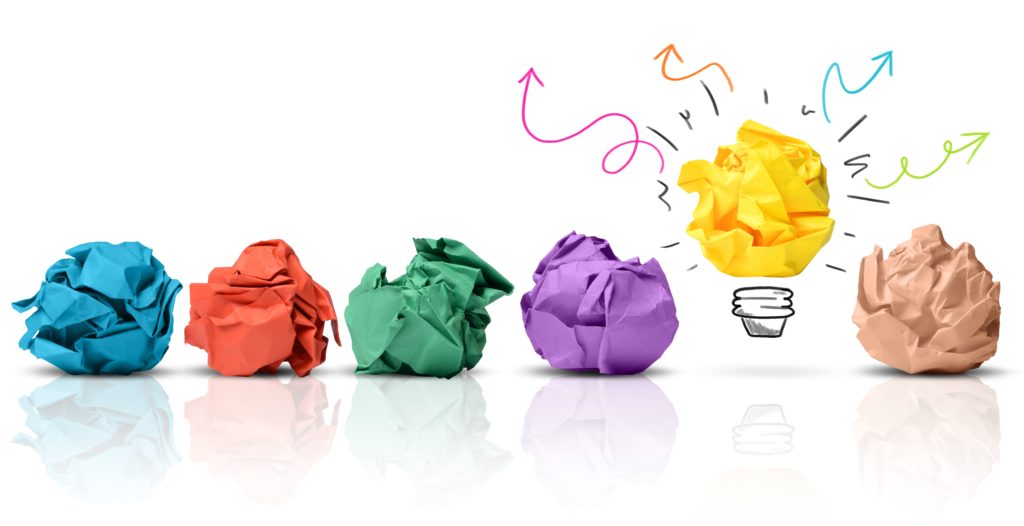Quick Hits
Daily brief research updates from the cognitive sciences

Can you learn creativity? Well, you can learn anything, and you can certainly learn to be more creative. But the big question is do those people high in creativity have brains that function differently? There has been a bunch of research that has promoted this idea that those high in creativity do have brains that function differently but there is still a lot to learn.
To help answer this question researchers at UCLA put exceptionally creative visual artists and scientists, known as “Big C” types (selected by a panel of experts and objective criteria) – into brain scanners to try to see what was happening in their brains during creative tasks.
And what did they find?
They found that, yes, creative people do use their brains differently and in an interesting way. When the brain processes information and engages in tasks the brain tends to send all signals through standard pathways and these are connected through various “hubs” such as a region called the thalamus. However, in creative people’s brains this seems to happen differently. They connect regions of the brains without going through these hubs.
This therefore suggests that this is an inborn process – I, for example, have no idea how to connect ideas without using my thalamus!
But this piece of research was also interesting because they compared different population groups specifically visual arts and sciences but also compared this to an IQ-matched comparison group to make sure this is not just a signature of intelligence. And they also found something else interesting.
They found that these Big C creatives had more efficient local brain connections at rest but when they ramped up on creativity tasks, they used the pattern above using less efficient but more divergent routes. So, this shows two things that are happening in the brains of creatives. They have efficient local connections and divergent global connections and when they ramp up for creative tasks their networks use less efficient but more novel pathways. That’s precisely why they’re so creative.
So yes, anther one to show that truly creative people do have brains that operate differently – how much can be learned is another question – but this seems to show this is a fixed attribute. But that is another question for another day.
I’m just trying to figure out how to make my brain less efficient!

Andy Habermacher
Andy is author of leading brains Review, Neuroleadership, and multiple other books. He has been intensively involved in writing and research into neuroleadership and is considered one of Europe’s leading experts. He is also a well-known public speaker speaking on the brain and human behaviour.
Andy is also a masters athlete (middle distance running) and competes regularly at international competitions (and holds a few national records in his age category).
Reference
Ariana Anderson, Kevin Japardi, Kendra S. Knudsen, Susan Y. Bookheimer, Dara G. Ghahremani, Robert M. Bilder.
Big-C creativity in artists and scientists is associated with more random global but less random local fMRI functional connectivity.
Psychology of Aesthetics, Creativity, and the Arts, 2022
DOI: 10.1037/aca0000463
More Quick Hits
Smartphones Improve Your Memory
Quick HitsDaily brief research updates from the cognitive sciencesany people believe that using smartphones and other electronic devices is ruining our memories and ability to think or simply use our brains. Research has shown a more nuanced...
How Meditation Helps Pain In Your Brain
Quick HitsDaily brief research updates from the cognitive sciences es, meditation can help with pain by changing your experience of it. I reported on that here. Another piece of research just published shows that how experienced meditators and...
When Stress Is Good For Brain Functioning
Quick HitsDaily brief research updates from the cognitive sciences tress gets a bad rap – understandably it is a negative experience and has been shown over long periods of time, and with high intensity, to cause multiple negative outcomes, from...
Put Your Smartphone Down and Let your Mind Wander – You’ll Be Happier
Quick HitsDaily brief research updates from the cognitive sciences here’s a lot been said about smartphone usage and how it can be used and abused. Most of this concern revolves around usage in children or teenagers, however, with some research...
The Amazing Impact Of Reaching Out To Your Old Friends
Quick HitsDaily brief research updates from the cognitive sciences few weeks ago a friend I hadn’t seen for about 10 years sent me a message and asked if I had time to meet up. I was elated. "Sure," I immediately messaged back, "when and where?!"...
Really? Belief In Conspiracies Not Increasing
Quick HitsDaily brief research updates from the cognitive sciences e may feel like we’re in an age of conspiracy theories, that social media is turbocharging the wild and wacky theories, and the so-called information bubbles are sending people down...






